Analysis of Social Policy: Neo-liberalism and New Conservatism in NZ
VerifiedAdded on 2023/06/13
|12
|3458
|142
Essay
AI Summary
This essay delves into the theoretical discourse surrounding social policy, with a specific focus on neo-liberalism and new conservatism in the context of New Zealand. It examines how neo-liberal ideologies, emphasizing individual entrepreneurial autonomy and free market trades, have influenced social policies, often prioritizing managerialism and resource rationing. The essay also contrasts the Keynesian Welfare Model with neo-liberal approaches in New Zealand's health system, highlighting shifts towards commercialization and user-pay expenditures. Furthermore, it explores the perspectives of new conservatism, particularly concerning individual preferences in areas like education, while also addressing inconsistencies and criticisms related to social issues such as gay marriage. The analysis emphasizes the importance of evaluating social policies through scientific procedures, considering the influence of governing beliefs and cultural elites, and addressing issues like child poverty despite existing social welfare programs. The essay concludes by noting New Zealand's commitment to global human rights obligations and the role of Civil Society Organizations in monitoring and promoting these rights.
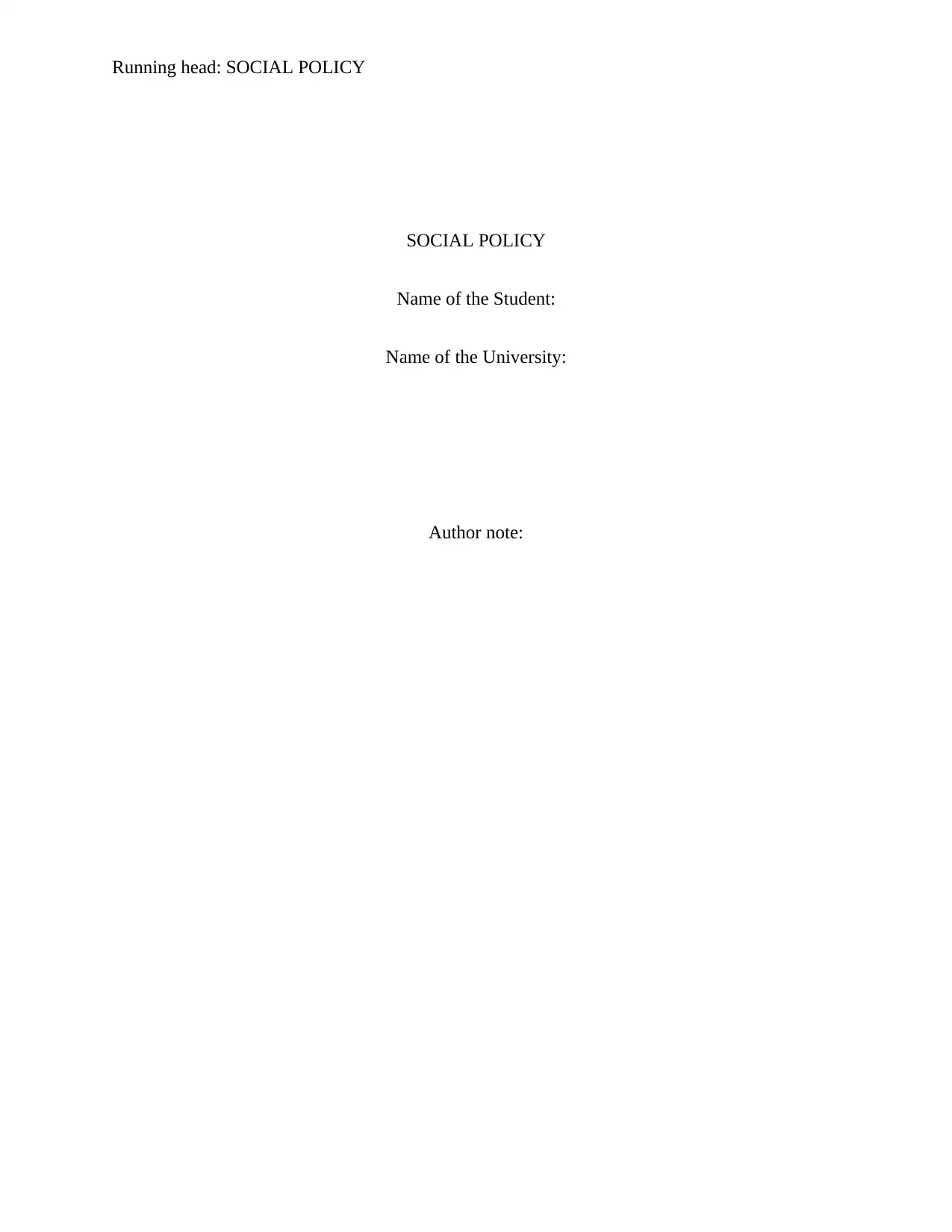
Running head: SOCIAL POLICY
SOCIAL POLICY
Name of the Student:
Name of the University:
Author note:
SOCIAL POLICY
Name of the Student:
Name of the University:
Author note:
Paraphrase This Document
Need a fresh take? Get an instant paraphrase of this document with our AI Paraphraser
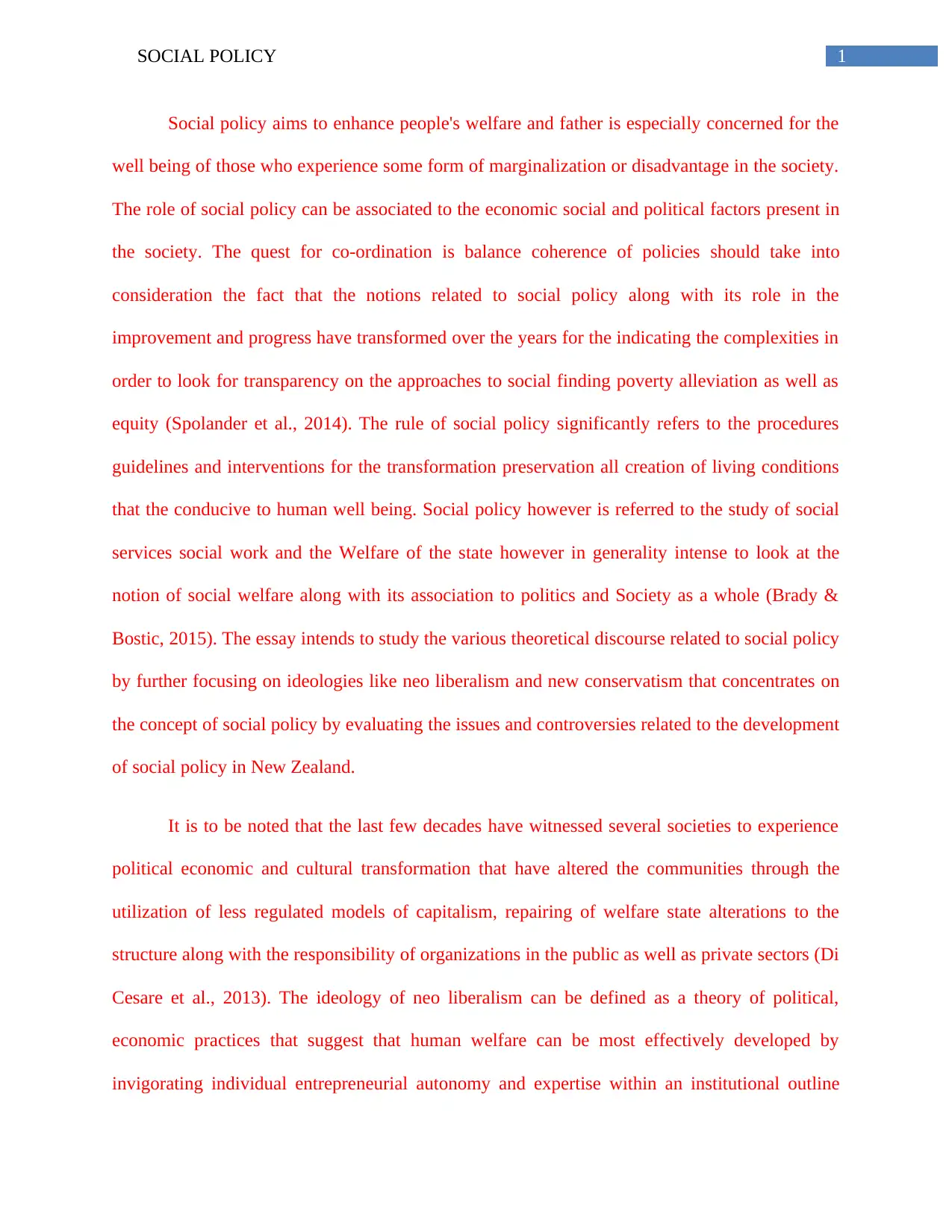
1SOCIAL POLICY
Social policy aims to enhance people's welfare and father is especially concerned for the
well being of those who experience some form of marginalization or disadvantage in the society.
The role of social policy can be associated to the economic social and political factors present in
the society. The quest for co-ordination is balance coherence of policies should take into
consideration the fact that the notions related to social policy along with its role in the
improvement and progress have transformed over the years for the indicating the complexities in
order to look for transparency on the approaches to social finding poverty alleviation as well as
equity (Spolander et al., 2014). The rule of social policy significantly refers to the procedures
guidelines and interventions for the transformation preservation all creation of living conditions
that the conducive to human well being. Social policy however is referred to the study of social
services social work and the Welfare of the state however in generality intense to look at the
notion of social welfare along with its association to politics and Society as a whole (Brady &
Bostic, 2015). The essay intends to study the various theoretical discourse related to social policy
by further focusing on ideologies like neo liberalism and new conservatism that concentrates on
the concept of social policy by evaluating the issues and controversies related to the development
of social policy in New Zealand.
It is to be noted that the last few decades have witnessed several societies to experience
political economic and cultural transformation that have altered the communities through the
utilization of less regulated models of capitalism, repairing of welfare state alterations to the
structure along with the responsibility of organizations in the public as well as private sectors (Di
Cesare et al., 2013). The ideology of neo liberalism can be defined as a theory of political,
economic practices that suggest that human welfare can be most effectively developed by
invigorating individual entrepreneurial autonomy and expertise within an institutional outline
Social policy aims to enhance people's welfare and father is especially concerned for the
well being of those who experience some form of marginalization or disadvantage in the society.
The role of social policy can be associated to the economic social and political factors present in
the society. The quest for co-ordination is balance coherence of policies should take into
consideration the fact that the notions related to social policy along with its role in the
improvement and progress have transformed over the years for the indicating the complexities in
order to look for transparency on the approaches to social finding poverty alleviation as well as
equity (Spolander et al., 2014). The rule of social policy significantly refers to the procedures
guidelines and interventions for the transformation preservation all creation of living conditions
that the conducive to human well being. Social policy however is referred to the study of social
services social work and the Welfare of the state however in generality intense to look at the
notion of social welfare along with its association to politics and Society as a whole (Brady &
Bostic, 2015). The essay intends to study the various theoretical discourse related to social policy
by further focusing on ideologies like neo liberalism and new conservatism that concentrates on
the concept of social policy by evaluating the issues and controversies related to the development
of social policy in New Zealand.
It is to be noted that the last few decades have witnessed several societies to experience
political economic and cultural transformation that have altered the communities through the
utilization of less regulated models of capitalism, repairing of welfare state alterations to the
structure along with the responsibility of organizations in the public as well as private sectors (Di
Cesare et al., 2013). The ideology of neo liberalism can be defined as a theory of political,
economic practices that suggest that human welfare can be most effectively developed by
invigorating individual entrepreneurial autonomy and expertise within an institutional outline
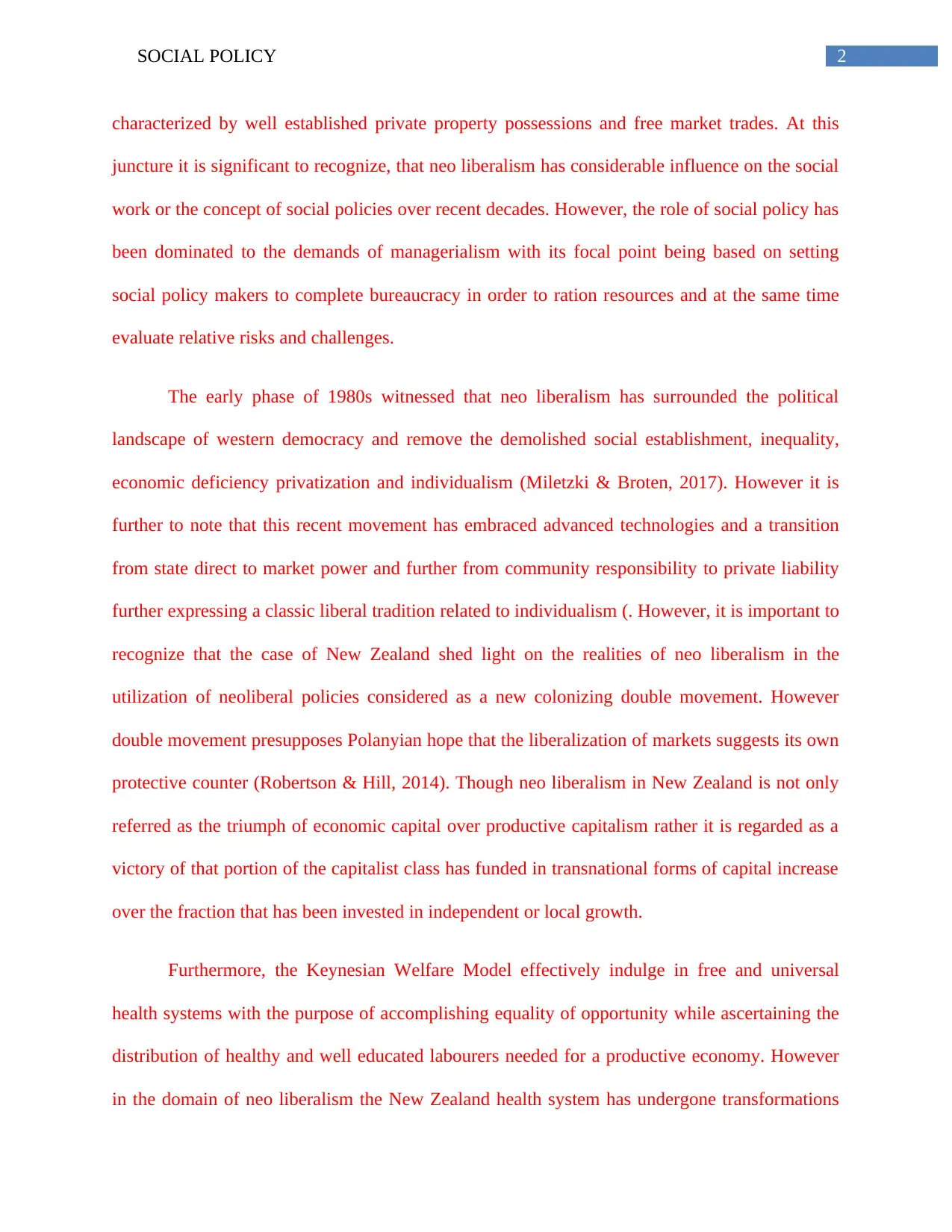
2SOCIAL POLICY
characterized by well established private property possessions and free market trades. At this
juncture it is significant to recognize, that neo liberalism has considerable influence on the social
work or the concept of social policies over recent decades. However, the role of social policy has
been dominated to the demands of managerialism with its focal point being based on setting
social policy makers to complete bureaucracy in order to ration resources and at the same time
evaluate relative risks and challenges.
The early phase of 1980s witnessed that neo liberalism has surrounded the political
landscape of western democracy and remove the demolished social establishment, inequality,
economic deficiency privatization and individualism (Miletzki & Broten, 2017). However it is
further to note that this recent movement has embraced advanced technologies and a transition
from state direct to market power and further from community responsibility to private liability
further expressing a classic liberal tradition related to individualism (. However, it is important to
recognize that the case of New Zealand shed light on the realities of neo liberalism in the
utilization of neoliberal policies considered as a new colonizing double movement. However
double movement presupposes Polanyian hope that the liberalization of markets suggests its own
protective counter (Robertson & Hill, 2014). Though neo liberalism in New Zealand is not only
referred as the triumph of economic capital over productive capitalism rather it is regarded as a
victory of that portion of the capitalist class has funded in transnational forms of capital increase
over the fraction that has been invested in independent or local growth.
Furthermore, the Keynesian Welfare Model effectively indulge in free and universal
health systems with the purpose of accomplishing equality of opportunity while ascertaining the
distribution of healthy and well educated labourers needed for a productive economy. However
in the domain of neo liberalism the New Zealand health system has undergone transformations
characterized by well established private property possessions and free market trades. At this
juncture it is significant to recognize, that neo liberalism has considerable influence on the social
work or the concept of social policies over recent decades. However, the role of social policy has
been dominated to the demands of managerialism with its focal point being based on setting
social policy makers to complete bureaucracy in order to ration resources and at the same time
evaluate relative risks and challenges.
The early phase of 1980s witnessed that neo liberalism has surrounded the political
landscape of western democracy and remove the demolished social establishment, inequality,
economic deficiency privatization and individualism (Miletzki & Broten, 2017). However it is
further to note that this recent movement has embraced advanced technologies and a transition
from state direct to market power and further from community responsibility to private liability
further expressing a classic liberal tradition related to individualism (. However, it is important to
recognize that the case of New Zealand shed light on the realities of neo liberalism in the
utilization of neoliberal policies considered as a new colonizing double movement. However
double movement presupposes Polanyian hope that the liberalization of markets suggests its own
protective counter (Robertson & Hill, 2014). Though neo liberalism in New Zealand is not only
referred as the triumph of economic capital over productive capitalism rather it is regarded as a
victory of that portion of the capitalist class has funded in transnational forms of capital increase
over the fraction that has been invested in independent or local growth.
Furthermore, the Keynesian Welfare Model effectively indulge in free and universal
health systems with the purpose of accomplishing equality of opportunity while ascertaining the
distribution of healthy and well educated labourers needed for a productive economy. However
in the domain of neo liberalism the New Zealand health system has undergone transformations
⊘ This is a preview!⊘
Do you want full access?
Subscribe today to unlock all pages.

Trusted by 1+ million students worldwide
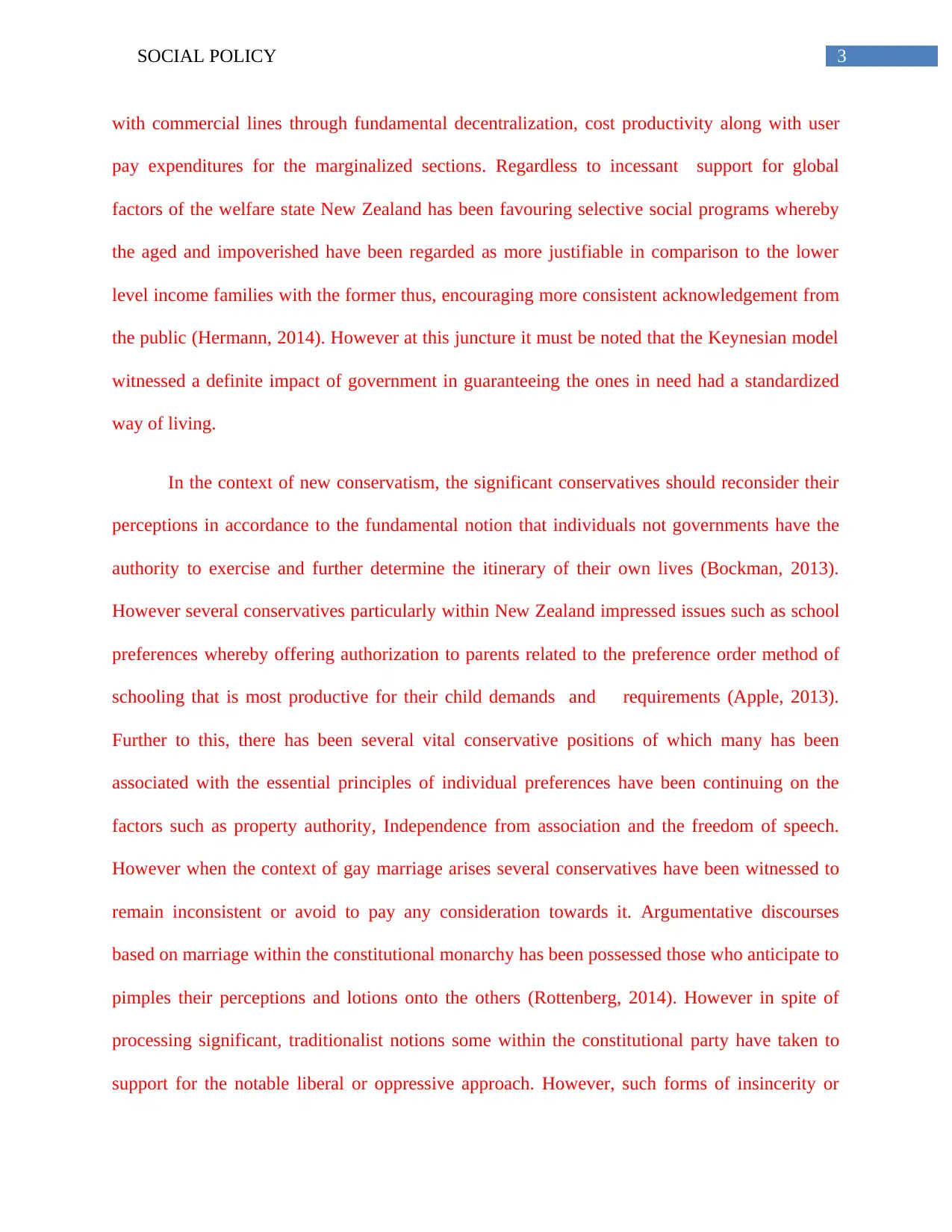
3SOCIAL POLICY
with commercial lines through fundamental decentralization, cost productivity along with user
pay expenditures for the marginalized sections. Regardless to incessant support for global
factors of the welfare state New Zealand has been favouring selective social programs whereby
the aged and impoverished have been regarded as more justifiable in comparison to the lower
level income families with the former thus, encouraging more consistent acknowledgement from
the public (Hermann, 2014). However at this juncture it must be noted that the Keynesian model
witnessed a definite impact of government in guaranteeing the ones in need had a standardized
way of living.
In the context of new conservatism, the significant conservatives should reconsider their
perceptions in accordance to the fundamental notion that individuals not governments have the
authority to exercise and further determine the itinerary of their own lives (Bockman, 2013).
However several conservatives particularly within New Zealand impressed issues such as school
preferences whereby offering authorization to parents related to the preference order method of
schooling that is most productive for their child demands and requirements (Apple, 2013).
Further to this, there has been several vital conservative positions of which many has been
associated with the essential principles of individual preferences have been continuing on the
factors such as property authority, Independence from association and the freedom of speech.
However when the context of gay marriage arises several conservatives have been witnessed to
remain inconsistent or avoid to pay any consideration towards it. Argumentative discourses
based on marriage within the constitutional monarchy has been possessed those who anticipate to
pimples their perceptions and lotions onto the others (Rottenberg, 2014). However in spite of
processing significant, traditionalist notions some within the constitutional party have taken to
support for the notable liberal or oppressive approach. However, such forms of insincerity or
with commercial lines through fundamental decentralization, cost productivity along with user
pay expenditures for the marginalized sections. Regardless to incessant support for global
factors of the welfare state New Zealand has been favouring selective social programs whereby
the aged and impoverished have been regarded as more justifiable in comparison to the lower
level income families with the former thus, encouraging more consistent acknowledgement from
the public (Hermann, 2014). However at this juncture it must be noted that the Keynesian model
witnessed a definite impact of government in guaranteeing the ones in need had a standardized
way of living.
In the context of new conservatism, the significant conservatives should reconsider their
perceptions in accordance to the fundamental notion that individuals not governments have the
authority to exercise and further determine the itinerary of their own lives (Bockman, 2013).
However several conservatives particularly within New Zealand impressed issues such as school
preferences whereby offering authorization to parents related to the preference order method of
schooling that is most productive for their child demands and requirements (Apple, 2013).
Further to this, there has been several vital conservative positions of which many has been
associated with the essential principles of individual preferences have been continuing on the
factors such as property authority, Independence from association and the freedom of speech.
However when the context of gay marriage arises several conservatives have been witnessed to
remain inconsistent or avoid to pay any consideration towards it. Argumentative discourses
based on marriage within the constitutional monarchy has been possessed those who anticipate to
pimples their perceptions and lotions onto the others (Rottenberg, 2014). However in spite of
processing significant, traditionalist notions some within the constitutional party have taken to
support for the notable liberal or oppressive approach. However, such forms of insincerity or
Paraphrase This Document
Need a fresh take? Get an instant paraphrase of this document with our AI Paraphraser
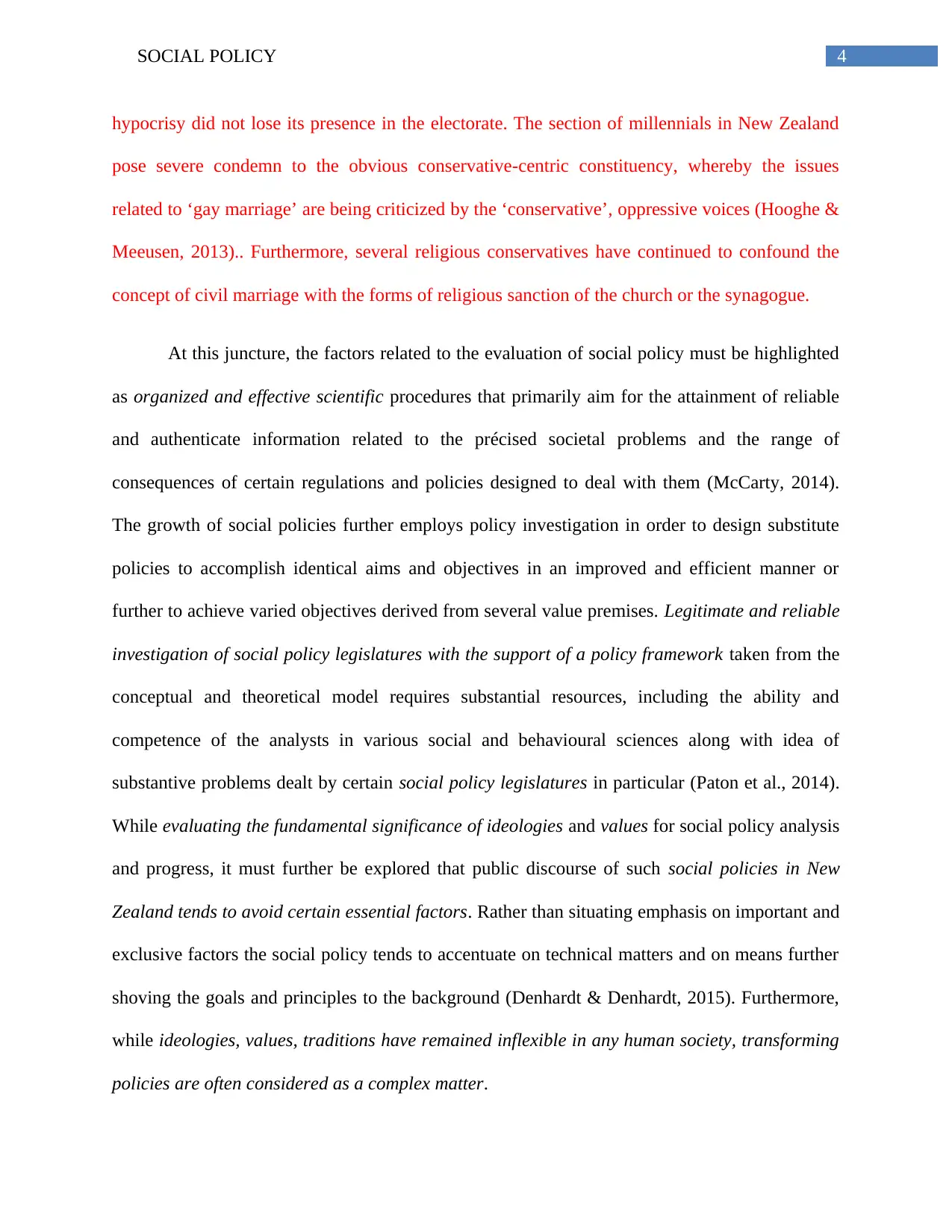
4SOCIAL POLICY
hypocrisy did not lose its presence in the electorate. The section of millennials in New Zealand
pose severe condemn to the obvious conservative-centric constituency, whereby the issues
related to ‘gay marriage’ are being criticized by the ‘conservative’, oppressive voices (Hooghe &
Meeusen, 2013).. Furthermore, several religious conservatives have continued to confound the
concept of civil marriage with the forms of religious sanction of the church or the synagogue.
At this juncture, the factors related to the evaluation of social policy must be highlighted
as organized and effective scientific procedures that primarily aim for the attainment of reliable
and authenticate information related to the précised societal problems and the range of
consequences of certain regulations and policies designed to deal with them (McCarty, 2014).
The growth of social policies further employs policy investigation in order to design substitute
policies to accomplish identical aims and objectives in an improved and efficient manner or
further to achieve varied objectives derived from several value premises. Legitimate and reliable
investigation of social policy legislatures with the support of a policy framework taken from the
conceptual and theoretical model requires substantial resources, including the ability and
competence of the analysts in various social and behavioural sciences along with idea of
substantive problems dealt by certain social policy legislatures in particular (Paton et al., 2014).
While evaluating the fundamental significance of ideologies and values for social policy analysis
and progress, it must further be explored that public discourse of such social policies in New
Zealand tends to avoid certain essential factors. Rather than situating emphasis on important and
exclusive factors the social policy tends to accentuate on technical matters and on means further
shoving the goals and principles to the background (Denhardt & Denhardt, 2015). Furthermore,
while ideologies, values, traditions have remained inflexible in any human society, transforming
policies are often considered as a complex matter.
hypocrisy did not lose its presence in the electorate. The section of millennials in New Zealand
pose severe condemn to the obvious conservative-centric constituency, whereby the issues
related to ‘gay marriage’ are being criticized by the ‘conservative’, oppressive voices (Hooghe &
Meeusen, 2013).. Furthermore, several religious conservatives have continued to confound the
concept of civil marriage with the forms of religious sanction of the church or the synagogue.
At this juncture, the factors related to the evaluation of social policy must be highlighted
as organized and effective scientific procedures that primarily aim for the attainment of reliable
and authenticate information related to the précised societal problems and the range of
consequences of certain regulations and policies designed to deal with them (McCarty, 2014).
The growth of social policies further employs policy investigation in order to design substitute
policies to accomplish identical aims and objectives in an improved and efficient manner or
further to achieve varied objectives derived from several value premises. Legitimate and reliable
investigation of social policy legislatures with the support of a policy framework taken from the
conceptual and theoretical model requires substantial resources, including the ability and
competence of the analysts in various social and behavioural sciences along with idea of
substantive problems dealt by certain social policy legislatures in particular (Paton et al., 2014).
While evaluating the fundamental significance of ideologies and values for social policy analysis
and progress, it must further be explored that public discourse of such social policies in New
Zealand tends to avoid certain essential factors. Rather than situating emphasis on important and
exclusive factors the social policy tends to accentuate on technical matters and on means further
shoving the goals and principles to the background (Denhardt & Denhardt, 2015). Furthermore,
while ideologies, values, traditions have remained inflexible in any human society, transforming
policies are often considered as a complex matter.
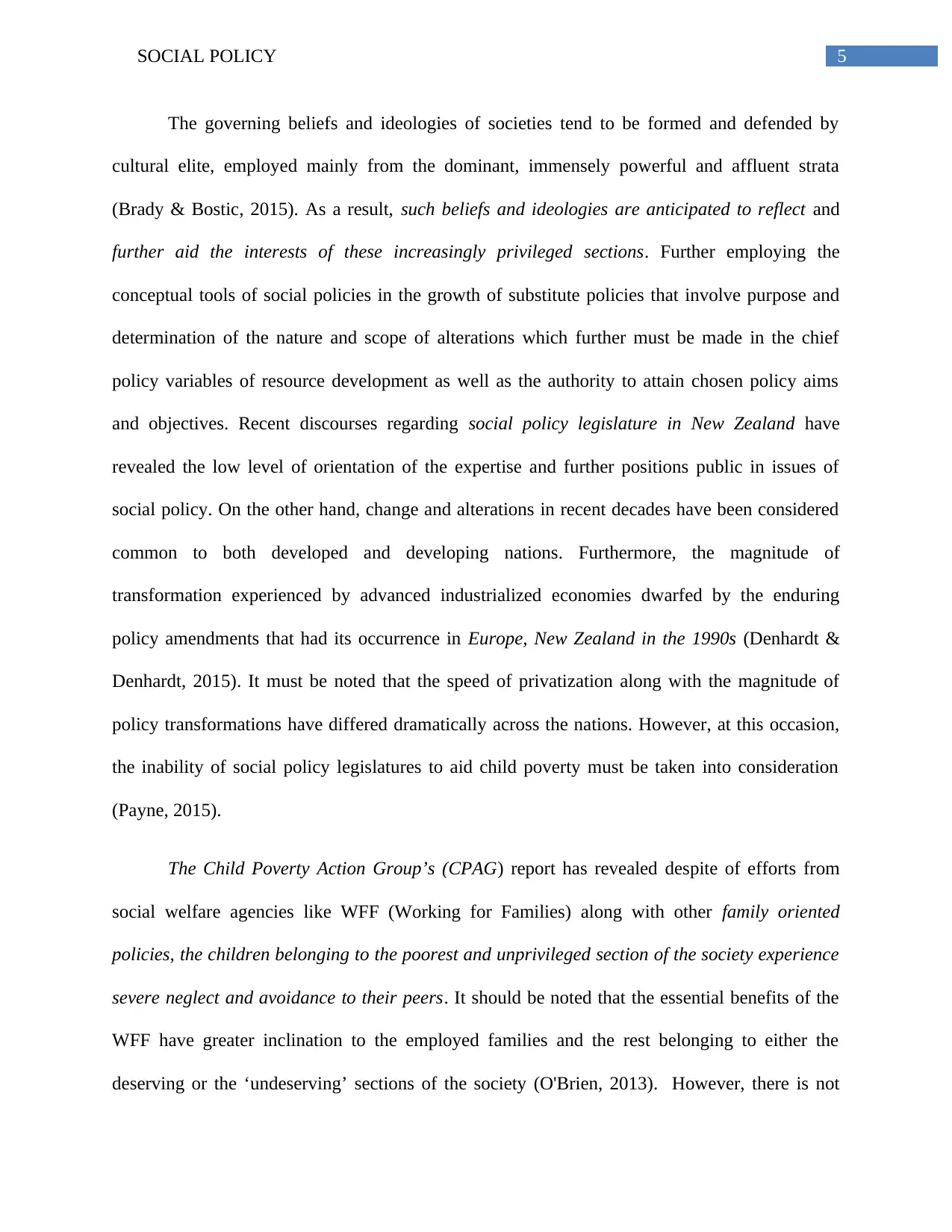
5SOCIAL POLICY
The governing beliefs and ideologies of societies tend to be formed and defended by
cultural elite, employed mainly from the dominant, immensely powerful and affluent strata
(Brady & Bostic, 2015). As a result, such beliefs and ideologies are anticipated to reflect and
further aid the interests of these increasingly privileged sections. Further employing the
conceptual tools of social policies in the growth of substitute policies that involve purpose and
determination of the nature and scope of alterations which further must be made in the chief
policy variables of resource development as well as the authority to attain chosen policy aims
and objectives. Recent discourses regarding social policy legislature in New Zealand have
revealed the low level of orientation of the expertise and further positions public in issues of
social policy. On the other hand, change and alterations in recent decades have been considered
common to both developed and developing nations. Furthermore, the magnitude of
transformation experienced by advanced industrialized economies dwarfed by the enduring
policy amendments that had its occurrence in Europe, New Zealand in the 1990s (Denhardt &
Denhardt, 2015). It must be noted that the speed of privatization along with the magnitude of
policy transformations have differed dramatically across the nations. However, at this occasion,
the inability of social policy legislatures to aid child poverty must be taken into consideration
(Payne, 2015).
The Child Poverty Action Group’s (CPAG) report has revealed despite of efforts from
social welfare agencies like WFF (Working for Families) along with other family oriented
policies, the children belonging to the poorest and unprivileged section of the society experience
severe neglect and avoidance to their peers. It should be noted that the essential benefits of the
WFF have greater inclination to the employed families and the rest belonging to either the
deserving or the ‘undeserving’ sections of the society (O'Brien, 2013). However, there is not
The governing beliefs and ideologies of societies tend to be formed and defended by
cultural elite, employed mainly from the dominant, immensely powerful and affluent strata
(Brady & Bostic, 2015). As a result, such beliefs and ideologies are anticipated to reflect and
further aid the interests of these increasingly privileged sections. Further employing the
conceptual tools of social policies in the growth of substitute policies that involve purpose and
determination of the nature and scope of alterations which further must be made in the chief
policy variables of resource development as well as the authority to attain chosen policy aims
and objectives. Recent discourses regarding social policy legislature in New Zealand have
revealed the low level of orientation of the expertise and further positions public in issues of
social policy. On the other hand, change and alterations in recent decades have been considered
common to both developed and developing nations. Furthermore, the magnitude of
transformation experienced by advanced industrialized economies dwarfed by the enduring
policy amendments that had its occurrence in Europe, New Zealand in the 1990s (Denhardt &
Denhardt, 2015). It must be noted that the speed of privatization along with the magnitude of
policy transformations have differed dramatically across the nations. However, at this occasion,
the inability of social policy legislatures to aid child poverty must be taken into consideration
(Payne, 2015).
The Child Poverty Action Group’s (CPAG) report has revealed despite of efforts from
social welfare agencies like WFF (Working for Families) along with other family oriented
policies, the children belonging to the poorest and unprivileged section of the society experience
severe neglect and avoidance to their peers. It should be noted that the essential benefits of the
WFF have greater inclination to the employed families and the rest belonging to either the
deserving or the ‘undeserving’ sections of the society (O'Brien, 2013). However, there is not
⊘ This is a preview!⊘
Do you want full access?
Subscribe today to unlock all pages.

Trusted by 1+ million students worldwide
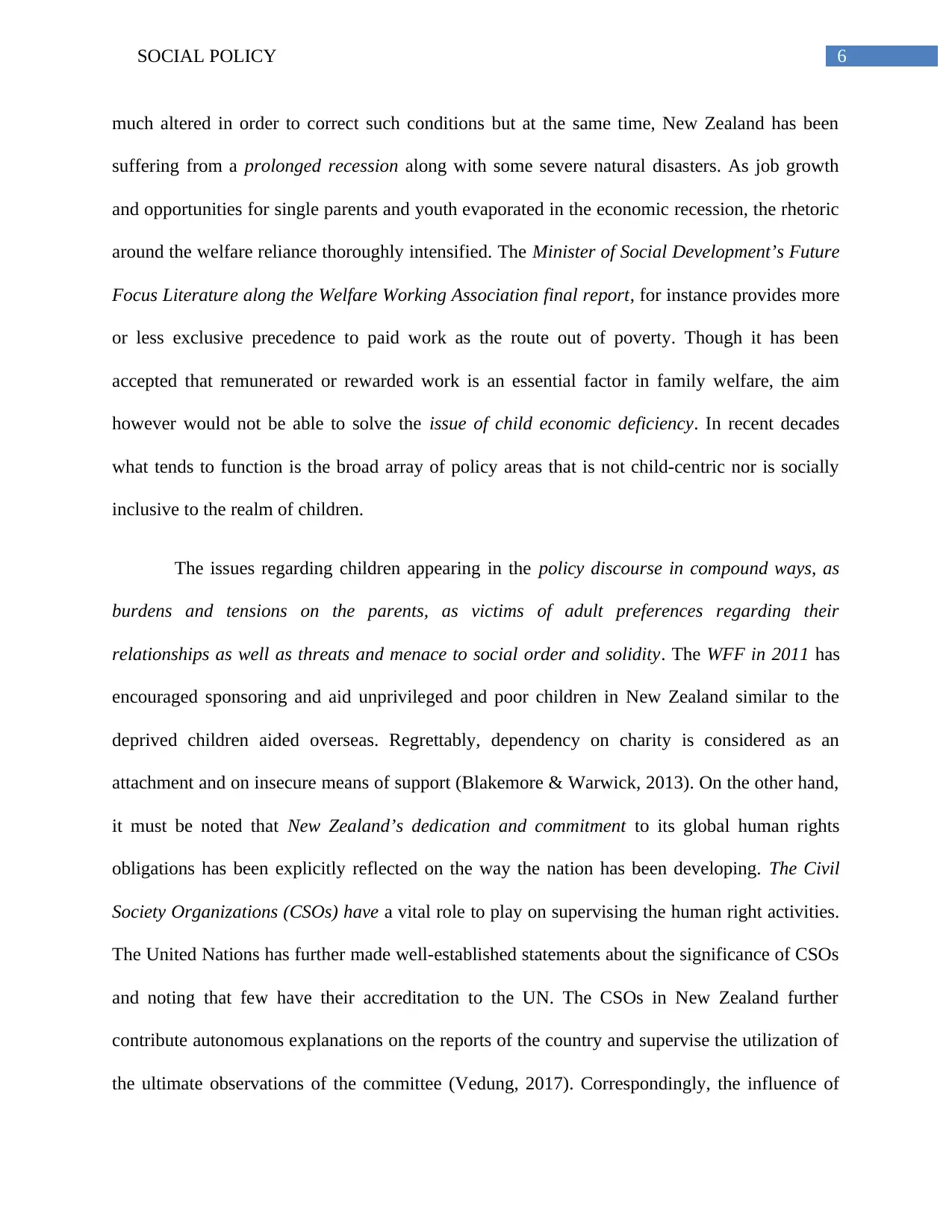
6SOCIAL POLICY
much altered in order to correct such conditions but at the same time, New Zealand has been
suffering from a prolonged recession along with some severe natural disasters. As job growth
and opportunities for single parents and youth evaporated in the economic recession, the rhetoric
around the welfare reliance thoroughly intensified. The Minister of Social Development’s Future
Focus Literature along the Welfare Working Association final report, for instance provides more
or less exclusive precedence to paid work as the route out of poverty. Though it has been
accepted that remunerated or rewarded work is an essential factor in family welfare, the aim
however would not be able to solve the issue of child economic deficiency. In recent decades
what tends to function is the broad array of policy areas that is not child-centric nor is socially
inclusive to the realm of children.
The issues regarding children appearing in the policy discourse in compound ways, as
burdens and tensions on the parents, as victims of adult preferences regarding their
relationships as well as threats and menace to social order and solidity. The WFF in 2011 has
encouraged sponsoring and aid unprivileged and poor children in New Zealand similar to the
deprived children aided overseas. Regrettably, dependency on charity is considered as an
attachment and on insecure means of support (Blakemore & Warwick, 2013). On the other hand,
it must be noted that New Zealand’s dedication and commitment to its global human rights
obligations has been explicitly reflected on the way the nation has been developing. The Civil
Society Organizations (CSOs) have a vital role to play on supervising the human right activities.
The United Nations has further made well-established statements about the significance of CSOs
and noting that few have their accreditation to the UN. The CSOs in New Zealand further
contribute autonomous explanations on the reports of the country and supervise the utilization of
the ultimate observations of the committee (Vedung, 2017). Correspondingly, the influence of
much altered in order to correct such conditions but at the same time, New Zealand has been
suffering from a prolonged recession along with some severe natural disasters. As job growth
and opportunities for single parents and youth evaporated in the economic recession, the rhetoric
around the welfare reliance thoroughly intensified. The Minister of Social Development’s Future
Focus Literature along the Welfare Working Association final report, for instance provides more
or less exclusive precedence to paid work as the route out of poverty. Though it has been
accepted that remunerated or rewarded work is an essential factor in family welfare, the aim
however would not be able to solve the issue of child economic deficiency. In recent decades
what tends to function is the broad array of policy areas that is not child-centric nor is socially
inclusive to the realm of children.
The issues regarding children appearing in the policy discourse in compound ways, as
burdens and tensions on the parents, as victims of adult preferences regarding their
relationships as well as threats and menace to social order and solidity. The WFF in 2011 has
encouraged sponsoring and aid unprivileged and poor children in New Zealand similar to the
deprived children aided overseas. Regrettably, dependency on charity is considered as an
attachment and on insecure means of support (Blakemore & Warwick, 2013). On the other hand,
it must be noted that New Zealand’s dedication and commitment to its global human rights
obligations has been explicitly reflected on the way the nation has been developing. The Civil
Society Organizations (CSOs) have a vital role to play on supervising the human right activities.
The United Nations has further made well-established statements about the significance of CSOs
and noting that few have their accreditation to the UN. The CSOs in New Zealand further
contribute autonomous explanations on the reports of the country and supervise the utilization of
the ultimate observations of the committee (Vedung, 2017). Correspondingly, the influence of
Paraphrase This Document
Need a fresh take? Get an instant paraphrase of this document with our AI Paraphraser
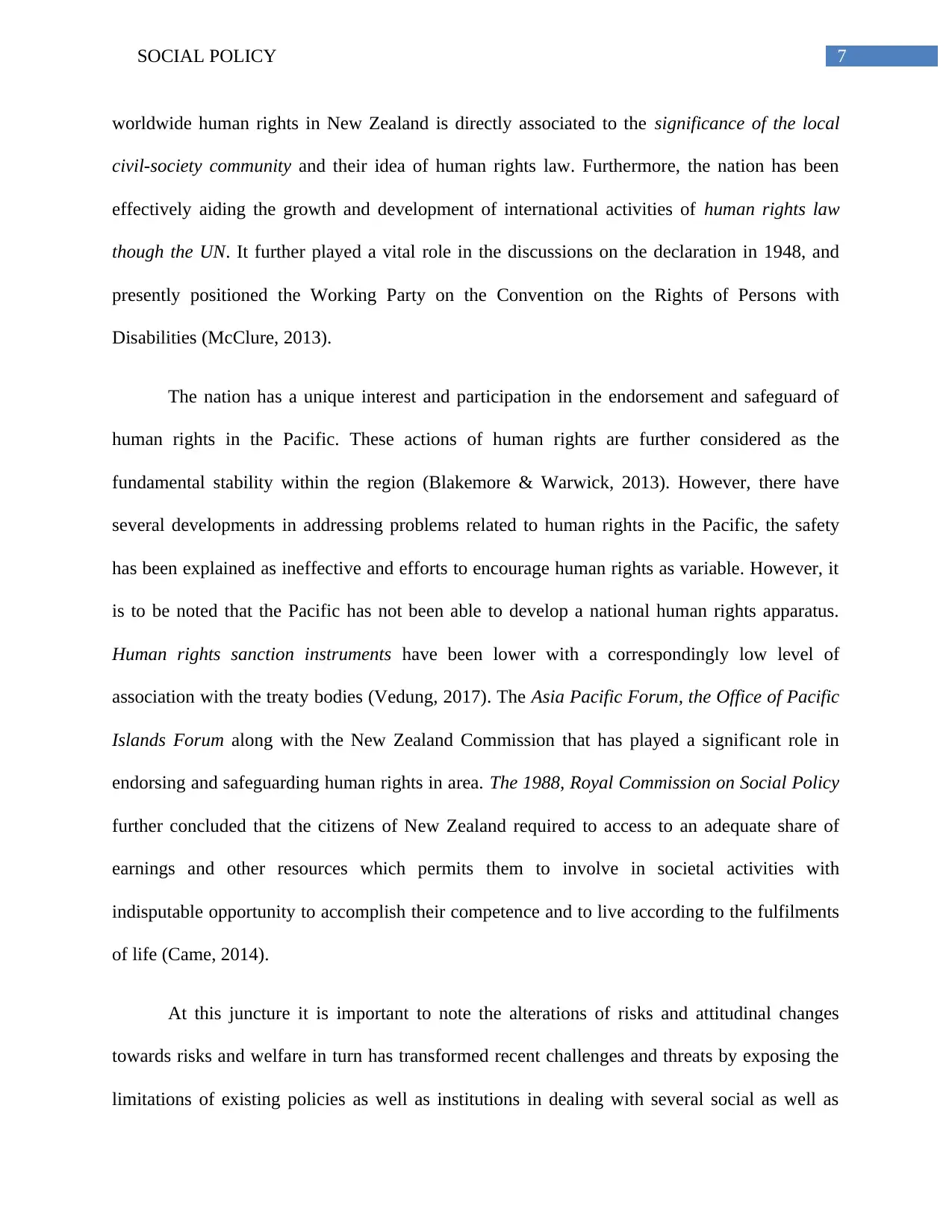
7SOCIAL POLICY
worldwide human rights in New Zealand is directly associated to the significance of the local
civil-society community and their idea of human rights law. Furthermore, the nation has been
effectively aiding the growth and development of international activities of human rights law
though the UN. It further played a vital role in the discussions on the declaration in 1948, and
presently positioned the Working Party on the Convention on the Rights of Persons with
Disabilities (McClure, 2013).
The nation has a unique interest and participation in the endorsement and safeguard of
human rights in the Pacific. These actions of human rights are further considered as the
fundamental stability within the region (Blakemore & Warwick, 2013). However, there have
several developments in addressing problems related to human rights in the Pacific, the safety
has been explained as ineffective and efforts to encourage human rights as variable. However, it
is to be noted that the Pacific has not been able to develop a national human rights apparatus.
Human rights sanction instruments have been lower with a correspondingly low level of
association with the treaty bodies (Vedung, 2017). The Asia Pacific Forum, the Office of Pacific
Islands Forum along with the New Zealand Commission that has played a significant role in
endorsing and safeguarding human rights in area. The 1988, Royal Commission on Social Policy
further concluded that the citizens of New Zealand required to access to an adequate share of
earnings and other resources which permits them to involve in societal activities with
indisputable opportunity to accomplish their competence and to live according to the fulfilments
of life (Came, 2014).
At this juncture it is important to note the alterations of risks and attitudinal changes
towards risks and welfare in turn has transformed recent challenges and threats by exposing the
limitations of existing policies as well as institutions in dealing with several social as well as
worldwide human rights in New Zealand is directly associated to the significance of the local
civil-society community and their idea of human rights law. Furthermore, the nation has been
effectively aiding the growth and development of international activities of human rights law
though the UN. It further played a vital role in the discussions on the declaration in 1948, and
presently positioned the Working Party on the Convention on the Rights of Persons with
Disabilities (McClure, 2013).
The nation has a unique interest and participation in the endorsement and safeguard of
human rights in the Pacific. These actions of human rights are further considered as the
fundamental stability within the region (Blakemore & Warwick, 2013). However, there have
several developments in addressing problems related to human rights in the Pacific, the safety
has been explained as ineffective and efforts to encourage human rights as variable. However, it
is to be noted that the Pacific has not been able to develop a national human rights apparatus.
Human rights sanction instruments have been lower with a correspondingly low level of
association with the treaty bodies (Vedung, 2017). The Asia Pacific Forum, the Office of Pacific
Islands Forum along with the New Zealand Commission that has played a significant role in
endorsing and safeguarding human rights in area. The 1988, Royal Commission on Social Policy
further concluded that the citizens of New Zealand required to access to an adequate share of
earnings and other resources which permits them to involve in societal activities with
indisputable opportunity to accomplish their competence and to live according to the fulfilments
of life (Came, 2014).
At this juncture it is important to note the alterations of risks and attitudinal changes
towards risks and welfare in turn has transformed recent challenges and threats by exposing the
limitations of existing policies as well as institutions in dealing with several social as well as
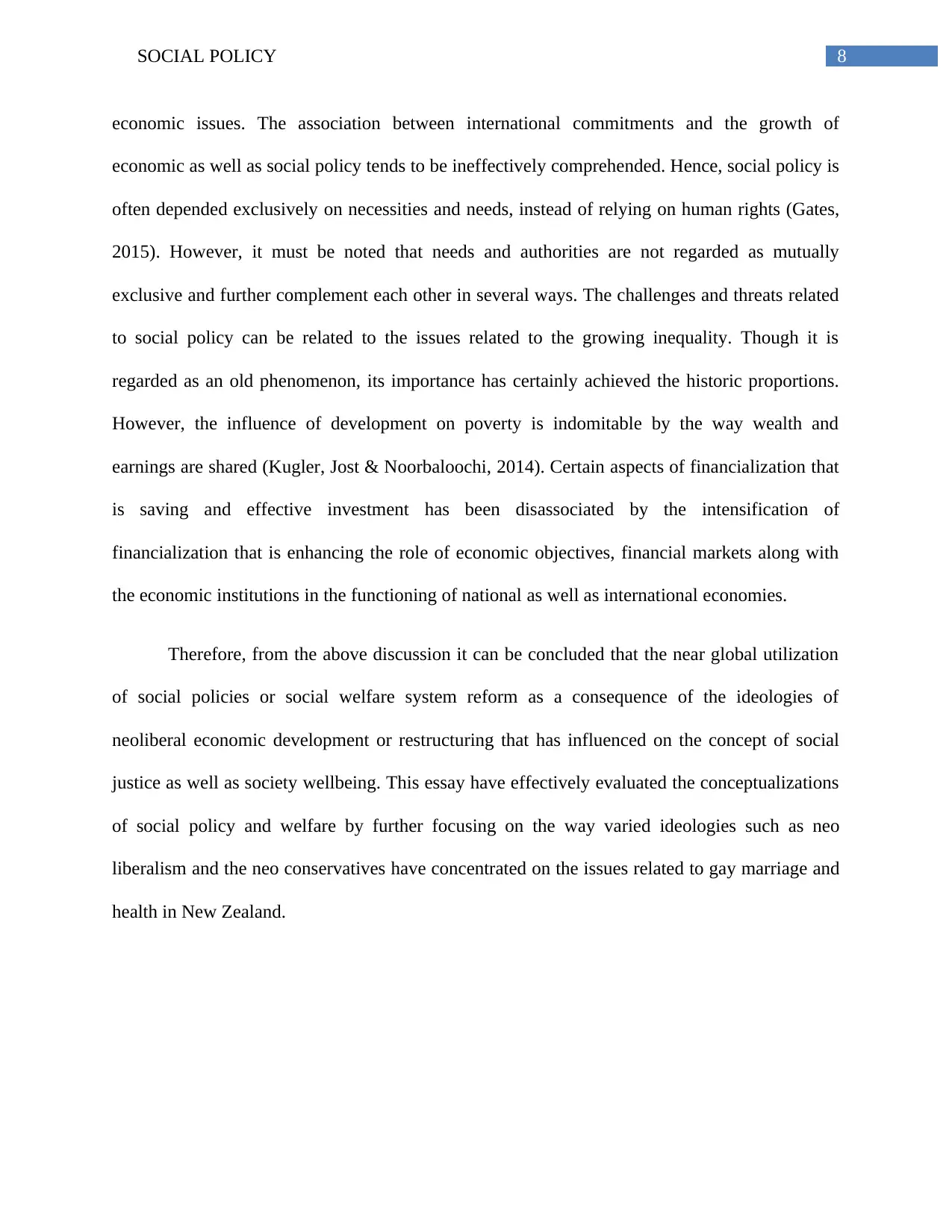
8SOCIAL POLICY
economic issues. The association between international commitments and the growth of
economic as well as social policy tends to be ineffectively comprehended. Hence, social policy is
often depended exclusively on necessities and needs, instead of relying on human rights (Gates,
2015). However, it must be noted that needs and authorities are not regarded as mutually
exclusive and further complement each other in several ways. The challenges and threats related
to social policy can be related to the issues related to the growing inequality. Though it is
regarded as an old phenomenon, its importance has certainly achieved the historic proportions.
However, the influence of development on poverty is indomitable by the way wealth and
earnings are shared (Kugler, Jost & Noorbaloochi, 2014). Certain aspects of financialization that
is saving and effective investment has been disassociated by the intensification of
financialization that is enhancing the role of economic objectives, financial markets along with
the economic institutions in the functioning of national as well as international economies.
Therefore, from the above discussion it can be concluded that the near global utilization
of social policies or social welfare system reform as a consequence of the ideologies of
neoliberal economic development or restructuring that has influenced on the concept of social
justice as well as society wellbeing. This essay have effectively evaluated the conceptualizations
of social policy and welfare by further focusing on the way varied ideologies such as neo
liberalism and the neo conservatives have concentrated on the issues related to gay marriage and
health in New Zealand.
economic issues. The association between international commitments and the growth of
economic as well as social policy tends to be ineffectively comprehended. Hence, social policy is
often depended exclusively on necessities and needs, instead of relying on human rights (Gates,
2015). However, it must be noted that needs and authorities are not regarded as mutually
exclusive and further complement each other in several ways. The challenges and threats related
to social policy can be related to the issues related to the growing inequality. Though it is
regarded as an old phenomenon, its importance has certainly achieved the historic proportions.
However, the influence of development on poverty is indomitable by the way wealth and
earnings are shared (Kugler, Jost & Noorbaloochi, 2014). Certain aspects of financialization that
is saving and effective investment has been disassociated by the intensification of
financialization that is enhancing the role of economic objectives, financial markets along with
the economic institutions in the functioning of national as well as international economies.
Therefore, from the above discussion it can be concluded that the near global utilization
of social policies or social welfare system reform as a consequence of the ideologies of
neoliberal economic development or restructuring that has influenced on the concept of social
justice as well as society wellbeing. This essay have effectively evaluated the conceptualizations
of social policy and welfare by further focusing on the way varied ideologies such as neo
liberalism and the neo conservatives have concentrated on the issues related to gay marriage and
health in New Zealand.
⊘ This is a preview!⊘
Do you want full access?
Subscribe today to unlock all pages.

Trusted by 1+ million students worldwide
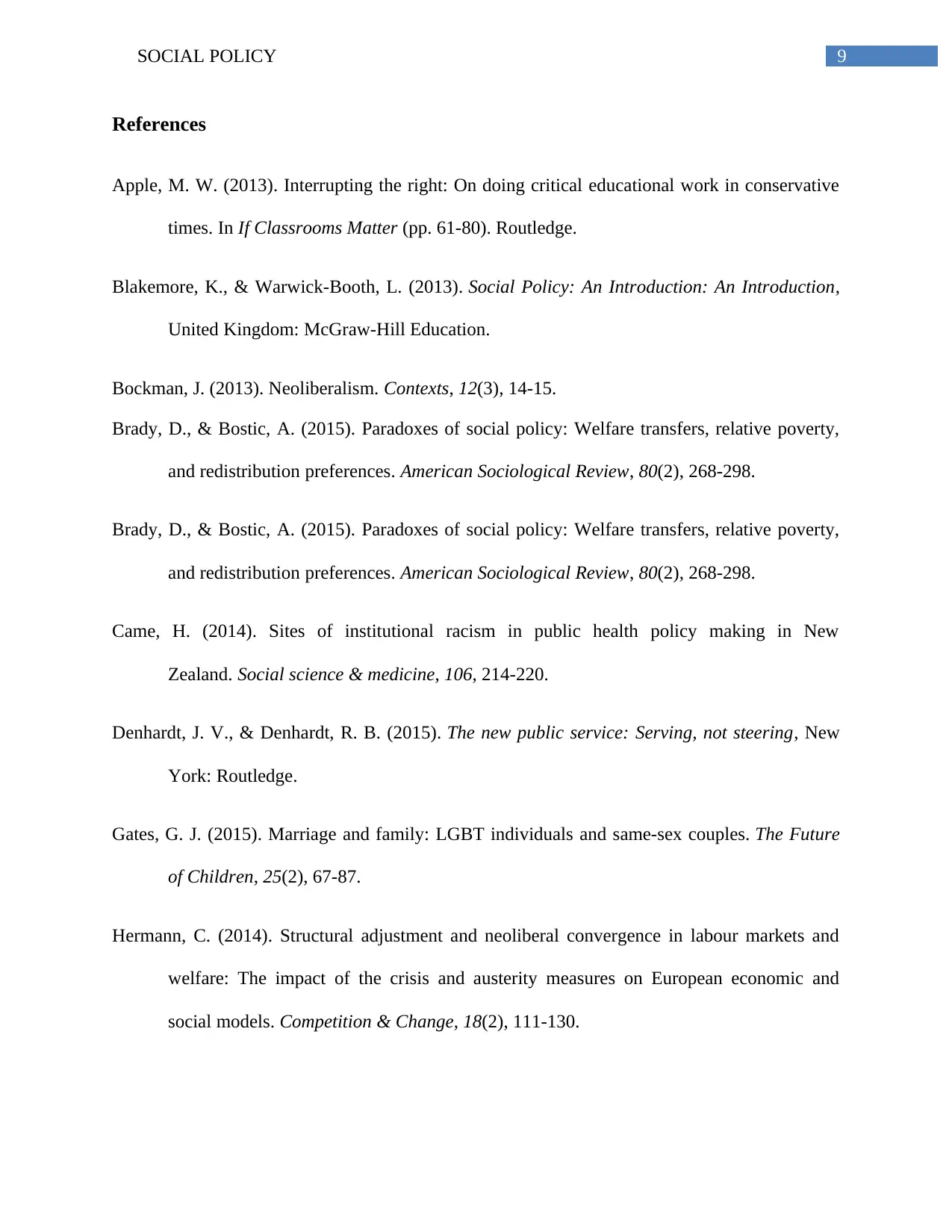
9SOCIAL POLICY
References
Apple, M. W. (2013). Interrupting the right: On doing critical educational work in conservative
times. In If Classrooms Matter (pp. 61-80). Routledge.
Blakemore, K., & Warwick-Booth, L. (2013). Social Policy: An Introduction: An Introduction,
United Kingdom: McGraw-Hill Education.
Bockman, J. (2013). Neoliberalism. Contexts, 12(3), 14-15.
Brady, D., & Bostic, A. (2015). Paradoxes of social policy: Welfare transfers, relative poverty,
and redistribution preferences. American Sociological Review, 80(2), 268-298.
Brady, D., & Bostic, A. (2015). Paradoxes of social policy: Welfare transfers, relative poverty,
and redistribution preferences. American Sociological Review, 80(2), 268-298.
Came, H. (2014). Sites of institutional racism in public health policy making in New
Zealand. Social science & medicine, 106, 214-220.
Denhardt, J. V., & Denhardt, R. B. (2015). The new public service: Serving, not steering, New
York: Routledge.
Gates, G. J. (2015). Marriage and family: LGBT individuals and same-sex couples. The Future
of Children, 25(2), 67-87.
Hermann, C. (2014). Structural adjustment and neoliberal convergence in labour markets and
welfare: The impact of the crisis and austerity measures on European economic and
social models. Competition & Change, 18(2), 111-130.
References
Apple, M. W. (2013). Interrupting the right: On doing critical educational work in conservative
times. In If Classrooms Matter (pp. 61-80). Routledge.
Blakemore, K., & Warwick-Booth, L. (2013). Social Policy: An Introduction: An Introduction,
United Kingdom: McGraw-Hill Education.
Bockman, J. (2013). Neoliberalism. Contexts, 12(3), 14-15.
Brady, D., & Bostic, A. (2015). Paradoxes of social policy: Welfare transfers, relative poverty,
and redistribution preferences. American Sociological Review, 80(2), 268-298.
Brady, D., & Bostic, A. (2015). Paradoxes of social policy: Welfare transfers, relative poverty,
and redistribution preferences. American Sociological Review, 80(2), 268-298.
Came, H. (2014). Sites of institutional racism in public health policy making in New
Zealand. Social science & medicine, 106, 214-220.
Denhardt, J. V., & Denhardt, R. B. (2015). The new public service: Serving, not steering, New
York: Routledge.
Gates, G. J. (2015). Marriage and family: LGBT individuals and same-sex couples. The Future
of Children, 25(2), 67-87.
Hermann, C. (2014). Structural adjustment and neoliberal convergence in labour markets and
welfare: The impact of the crisis and austerity measures on European economic and
social models. Competition & Change, 18(2), 111-130.
Paraphrase This Document
Need a fresh take? Get an instant paraphrase of this document with our AI Paraphraser
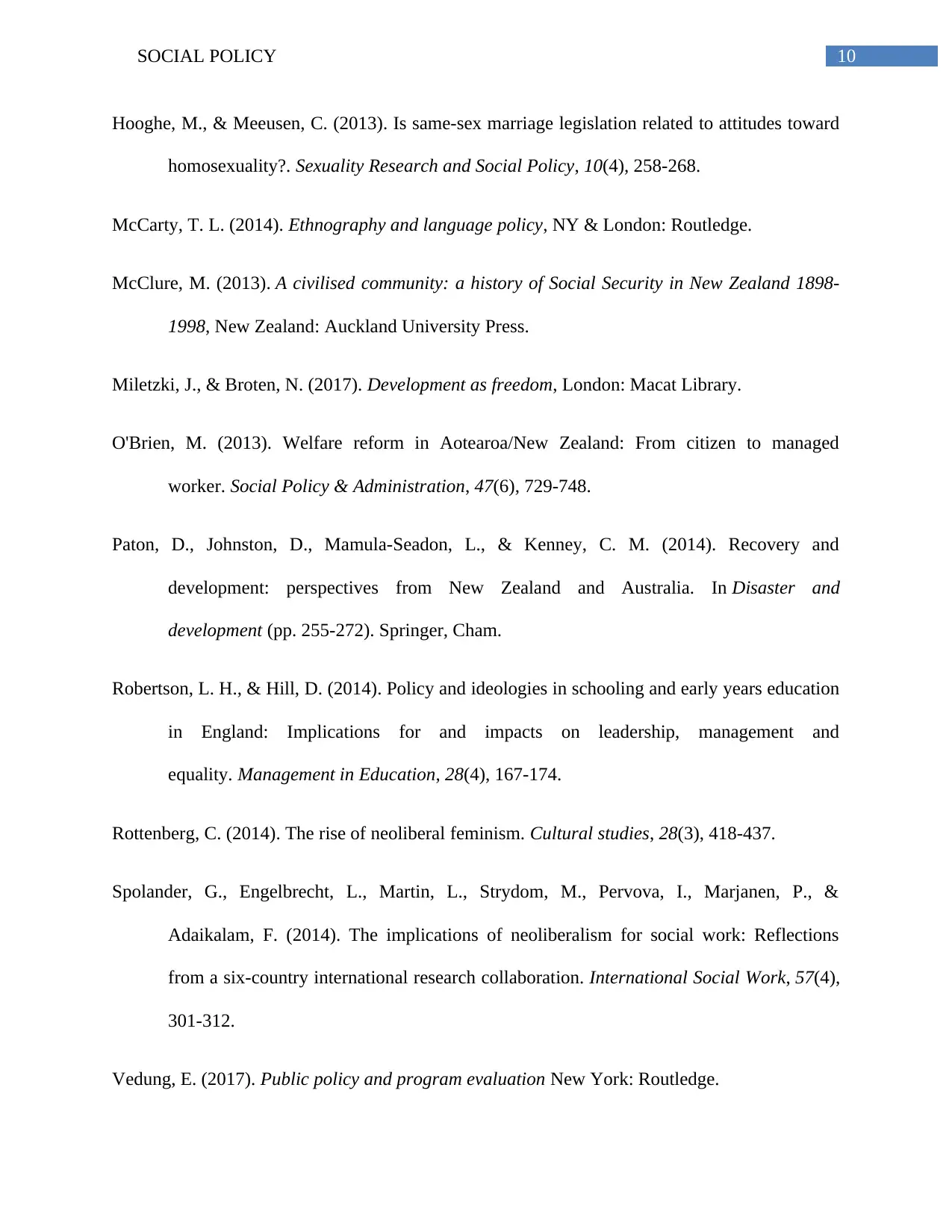
10SOCIAL POLICY
Hooghe, M., & Meeusen, C. (2013). Is same-sex marriage legislation related to attitudes toward
homosexuality?. Sexuality Research and Social Policy, 10(4), 258-268.
McCarty, T. L. (2014). Ethnography and language policy, NY & London: Routledge.
McClure, M. (2013). A civilised community: a history of Social Security in New Zealand 1898-
1998, New Zealand: Auckland University Press.
Miletzki, J., & Broten, N. (2017). Development as freedom, London: Macat Library.
O'Brien, M. (2013). Welfare reform in Aotearoa/New Zealand: From citizen to managed
worker. Social Policy & Administration, 47(6), 729-748.
Paton, D., Johnston, D., Mamula-Seadon, L., & Kenney, C. M. (2014). Recovery and
development: perspectives from New Zealand and Australia. In Disaster and
development (pp. 255-272). Springer, Cham.
Robertson, L. H., & Hill, D. (2014). Policy and ideologies in schooling and early years education
in England: Implications for and impacts on leadership, management and
equality. Management in Education, 28(4), 167-174.
Rottenberg, C. (2014). The rise of neoliberal feminism. Cultural studies, 28(3), 418-437.
Spolander, G., Engelbrecht, L., Martin, L., Strydom, M., Pervova, I., Marjanen, P., &
Adaikalam, F. (2014). The implications of neoliberalism for social work: Reflections
from a six-country international research collaboration. International Social Work, 57(4),
301-312.
Vedung, E. (2017). Public policy and program evaluation New York: Routledge.
Hooghe, M., & Meeusen, C. (2013). Is same-sex marriage legislation related to attitudes toward
homosexuality?. Sexuality Research and Social Policy, 10(4), 258-268.
McCarty, T. L. (2014). Ethnography and language policy, NY & London: Routledge.
McClure, M. (2013). A civilised community: a history of Social Security in New Zealand 1898-
1998, New Zealand: Auckland University Press.
Miletzki, J., & Broten, N. (2017). Development as freedom, London: Macat Library.
O'Brien, M. (2013). Welfare reform in Aotearoa/New Zealand: From citizen to managed
worker. Social Policy & Administration, 47(6), 729-748.
Paton, D., Johnston, D., Mamula-Seadon, L., & Kenney, C. M. (2014). Recovery and
development: perspectives from New Zealand and Australia. In Disaster and
development (pp. 255-272). Springer, Cham.
Robertson, L. H., & Hill, D. (2014). Policy and ideologies in schooling and early years education
in England: Implications for and impacts on leadership, management and
equality. Management in Education, 28(4), 167-174.
Rottenberg, C. (2014). The rise of neoliberal feminism. Cultural studies, 28(3), 418-437.
Spolander, G., Engelbrecht, L., Martin, L., Strydom, M., Pervova, I., Marjanen, P., &
Adaikalam, F. (2014). The implications of neoliberalism for social work: Reflections
from a six-country international research collaboration. International Social Work, 57(4),
301-312.
Vedung, E. (2017). Public policy and program evaluation New York: Routledge.
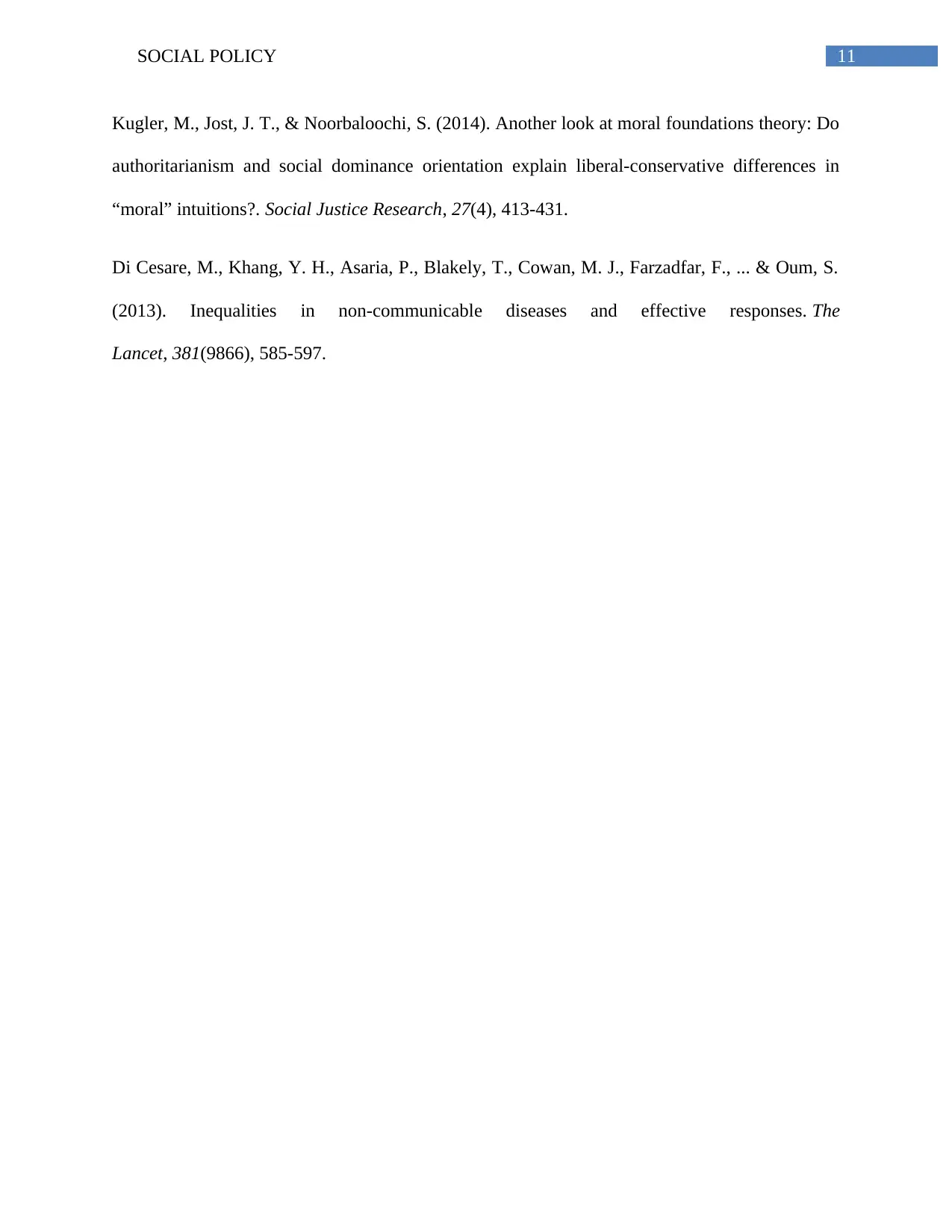
11SOCIAL POLICY
Kugler, M., Jost, J. T., & Noorbaloochi, S. (2014). Another look at moral foundations theory: Do
authoritarianism and social dominance orientation explain liberal-conservative differences in
“moral” intuitions?. Social Justice Research, 27(4), 413-431.
Di Cesare, M., Khang, Y. H., Asaria, P., Blakely, T., Cowan, M. J., Farzadfar, F., ... & Oum, S.
(2013). Inequalities in non-communicable diseases and effective responses. The
Lancet, 381(9866), 585-597.
Kugler, M., Jost, J. T., & Noorbaloochi, S. (2014). Another look at moral foundations theory: Do
authoritarianism and social dominance orientation explain liberal-conservative differences in
“moral” intuitions?. Social Justice Research, 27(4), 413-431.
Di Cesare, M., Khang, Y. H., Asaria, P., Blakely, T., Cowan, M. J., Farzadfar, F., ... & Oum, S.
(2013). Inequalities in non-communicable diseases and effective responses. The
Lancet, 381(9866), 585-597.
⊘ This is a preview!⊘
Do you want full access?
Subscribe today to unlock all pages.

Trusted by 1+ million students worldwide
1 out of 12
Related Documents
Your All-in-One AI-Powered Toolkit for Academic Success.
+13062052269
info@desklib.com
Available 24*7 on WhatsApp / Email
![[object Object]](/_next/static/media/star-bottom.7253800d.svg)
Unlock your academic potential
Copyright © 2020–2026 A2Z Services. All Rights Reserved. Developed and managed by ZUCOL.




